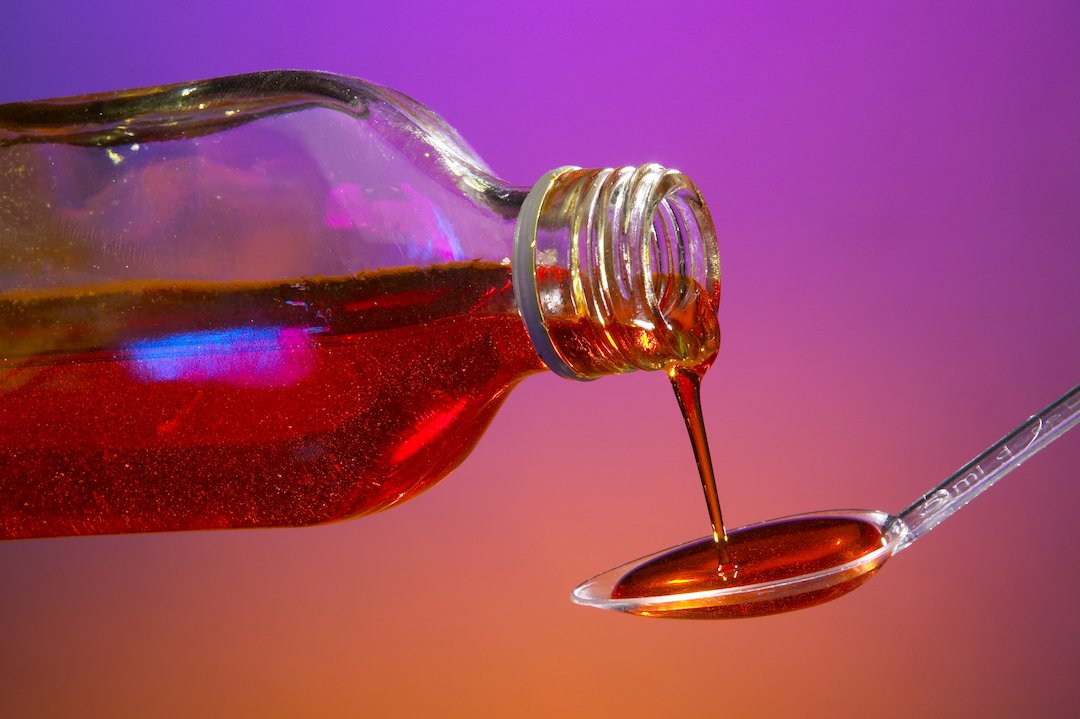
The Nasty Ingredients in Your Medicine Cabinet + 6 Legit Natural Alternatives
When you're sick, all anybody really wants is a little relief. Odds are, if you open your medicine cabinet right now, there is at least one bottle of neon-colored cough syrup—or maybe a pack of candy-like cough drops—or some other OTC special sauce to ease the head-pounding discomfort of an unwelcome virus. (And let's be real, they're all probably expired, but that's beside the point.) The irony is, you're probably really careful about what you put in your body in terms of food, but have you ever actually considered what's in your medicine? Those hyper-sweet flavors and neon colors definitely aren't natural, and they might actually slow down healing. Why? Because these meds are full of nasties.



1. Sugar, sugar, everywhere.
Let’s look at sugar, for example. The incredible quantity of sugar in OTC cough syrups and drops is astounding. And counterproductive. Consuming a lot of sugar when you’re feeling under the weather actually works to weaken your immune system—so it’ll just take you longer to heal. And what’s even worse is that a lot of the sugar in these formulas comes from high-fructose corn syrup—practically the embodiment of liquid inflammation. That cough drop doesn’t seem so soothing anymore, does it? Sure, you’re not taking much of it, but medicines should be filled with ingredients that HEAL you—not cheap, unhealthy sweeteners.2. Unnecessary fillers can still cause side effects.
Then there are those inactive additives that act as filler ingredients. The problem is, these can still cause unpleasant side effects, so they provide no real support—only more problems. Take sorbitol, for example. This sugar alcohol is actually used as the active ingredient in laxatives. But it is also a common filler ingredient in many cough syrups and antacids. The problem is that laxative effect doesn't just disappear—it becomes an undesired side effect alongside your cough of tummy discomfort. Sorbitol is incredibly difficult for most people to digest and can lead to bloating, excessive flatulence, and diarrhea. That's definitely not what you want when you're fighting off a bug. And it's even worse for those suffering from inflammatory bowel conditions like IBS. Does this really belong in our medicine?3. Since when did endocrine disruptors help fight viruses?
One more thing. Your cough syrup may contain hormone-disrupting parabens—like methylparaben, propylparaben, butylparaben, or ethylparaben. You know, the chemicals you avoid like the plague in your shampoos, body lotions, and even toothpaste. Commonly used as a preservative in personal care products, parabens are xenoestrogens, meaning they have the ability to mimic estrogen in the body. With a weak estrogenic effect, it's no wonder why they throw the body's hormonal balance for a loop. Potentially carcinogenic, many researchers and organizations have massive concerns about the health and safety of parabens, so until more conclusive research is conducted it's probably best to avoid them. And that means avoiding many formulations of cough syrup. Seriously, gross.
Instead, heal naturally with these legit alternatives...
Modern medicine is really miraculous for some things, but Mother Nature has totally got your sniffles covered. No chemicals, no added sugars, no potential carcinogens. Just clean, powerful foods that keep you out of bed and feeling great. Here are a few of our favs...Elderberry.
Study after study has shown that elderberry syrup is a powerful ally against viruses. Used traditionally for thousands of years, it is renown for its antiviral properties and rich antioxidant content. In fact, one study demonstrated that supplementation with elderberry helps to shorten the duration of the influenza virus by 2 days and significantly decreases severity, in comparison to a placebo. It's nature's super powerful version of cough syrup.Oregano oil.
Did you know this common herb actually has potent sniffle-fighting properties? The volatile oil compounds in oregano oil have been used for thousands of years for their antiviral and respiratory-supportive powers. And there's real science behind it. One study showed that a spray containing oregano oil temporarily improved throat symptoms in those with respiratory tract infections significantly more than a placebo. A 2017 study found that oregano oil has strong antioxidant properties as well. It's super powerful, so make sure you keep crushing your hydration game and always dilute it in water.
Propolis.
We’re trying to be impartial, but this one’s definitely our fav! Super rich in free radical-busting antioxidants along with hundreds of other beneficial compounds, propolis is our secret to staying healthy. Studies have shown that propolis has truly astounding antiviral and germ-fighting properties that rival many pharmaceutical compounds. When used on the regular, it lends the immune system a powerful hand while crushing swelling and inflammation. No bathroom cabinet is complete without it.Raw honey.
Actually, we’re pretty big on this one, too. Raw honey possesses natural antiviral properties that can support the immune system. It also has been shown in studies to help coughing children sleep even better than OTC cough medicine! Buckwheat honey is the ideal choice for immune support, as it has the highest concentration of antioxidants of any honey. And it’s absolutely divine when stirred in to some soothing turmeric-ginger tea—speaking of which…
